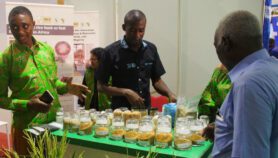By: T.V. Padma
Send to a friend
The details you provide on this page will not be used to send unsolicited email, and will not be sold to a 3rd party. See privacy policy.
[NEW DELHI] Sharp divisions between developing and developed countries will come to the fore, putting them at "loggerheads", next week at the world’s biggest international conference on biodiversity, in Nagoya, Japan, according to India’s environment and forests minister, Jairam Ramesh.
The divisions are over access to local biological resources and sharing the benefits of such access with local communities, he told a press conference today, called to highlight India’s position ahead of the 10th meeting of the Conference of Parties (COP-10) of the Convention on Biological Diversity next week (18–29 October).
Governments from around the world are gathering in Nagoya to make three key decisions on safeguarding the world’s natural riches.
First, they are hoping to agree on a ten-year strategy on how people interact with biodiversity, which scientists say is key to preventing tipping points, such as the collapse of fisheries, disappearance of the Amazonian rainforest and extinctions caused by invasive species.
They also need to agree on the money required to enact this strategy and, thirdly, they hope to produce a set of international rules about access to the biological resources which would ensure countries and communities get a fair share of any benefits that arise from their use.
But Ramesh said that five issues have emerged as "sticking points" on the third decision. He highlighted divisions relating to access to microbes that cause disease (pathogens).
Developing countries, and especially India, are keen to include pathogens in the agreement because of the emergence of new epidemics such as swine flu, and the interest of big drug firms in using strains found in developing countries to make new vaccines, drugs and diagnostics.
"The companies will take the pathogen, make the drug and we (developing countries) will have to pay billions of dollars to buy the drug from them," Ramesh argued. So developed countries prefer to keep human pathogens out of any agreement on access and benefit sharing, he said.
The second contentious issue relating to benefit-sharing is that developed countries would prefer to limit any deal to include only the original resource, while developing countries want the final products also to be included.
Other major sticking points include the type of agreement and the date it goes live.
Developed countries would prefer the agreement to become binding in the same year it is signed but most countries from Africa and Central America want it to be retrospective.
Another bone of contention is "point of control", said Ramesh. Developing countries, particularly India, want each country’s patent office to be in charge of deciding on access and benefit-sharing with local communities. But developed countries "are uneasy with the role of patent offices", he said.
India is one of the few countries to enact a domestic law on access and benefit sharing, Ramesh said. The law was enacted in 2007 and 80 companies have so far signed such agreements in the country.
An example is PepsiCo, the soft drink manufacturer, which has agreed to pay Rs 3.7 million (US$0.08 million) to be divided among 1,000 local fishermen in the southern state of Tamil Nadu, for extracting a seaweed from their area along the Bay of Bengal, to make health stimulants.













